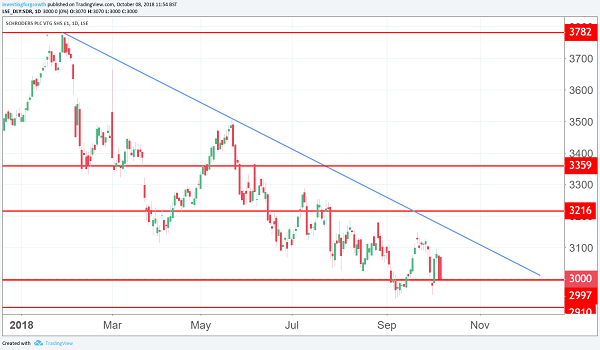Lloyds Bank and Schroders' wealth tie-up highlights attractive entry point
8th October 2018 12:07
by Lee Wild from interactive investor
Talk of a three-pronged deal involving Lloyds Banking Group and Schroders is grabbing headlines, and experts believe the current valuation should too, reports Lee Wild.

Neither Lloyds Banking Group or Schroders has had much to shout about in 2018, but will a plan to spin off Lloyds' £13 billion wealth management arm into a joint venture (JV) with Schroders give their shares a much-needed boost?
Since peaking at nearly £38 in January, Schroders shares have slumped by 20% and Lloyds by 19%, both underperforming the FTSE 350 Banks index, down around 14% currently.
Speculation late last week, and ramped up over the weekend by Sky News, has Lloyds owning 50.1% of a new wealth management JV and Schroders the rest. The idea is to exploit Lloyds' huge branch network to distribute Schroders' fund management expertise.
As part of a three-pronged tie-up between the two financial powerhouses, Schroders will also get the £109 billion Scottish Widows contract - the Lloyds insurance mandate being withdrawn from Standard Life Aberdeen.
Rumour has is that this would be predicated on Lloyds buying a 19.9% stake in Schroders' wealth arm Cazenove Capital.
And this morning, Schroders said:
"Following recent media speculation, Schroders plc confirms that it is in discussions with Lloyds Banking Group plc with a view to working closely together in parts of the wealth sector. Discussions are ongoing and there can be no certainty that these discussions will lead to any formal arrangement being entered into. A further announcement will be made when appropriate."
"Perhaps Cazenove's name will return," muses finnCap financials analyst Jeremy Grime.
After a 2% spike at the start of Monday's trading session - very likely driven by growing confidence it has seen off competition for the mandate from BlackRock, JP Morgan Asset Management and Goldman Sachs Asset Management - Schroders shares are little changed late morning.

Source: TradingView (*) Past performance is not a guide to future performance
According to analysts at UBS, the Scottish Widows business would increase Schroders' earnings by 5-7%, assuming a revenue margin of 12 basis points and underlying cash profit margin on the new business of 40-55%.
"In addition, it would give Schroders an important scale advantage when attempting to win further mandates from insurers, given the scale driven nature of the business," writes UBS analyst Michael Werner, who admits he'd have to see the detail before assessing the attractiveness of a deal to Schroders shareholders.
• Should you follow Neil Woodford and sell Lloyds Bank shares?
• What to make of Lloyds Bank results
Trading on a modest 13 times earnings estimates for 2018, dropping to 12.2 for next year, and supported by a 4% dividend yield, Werner still rates the shares a 'buy', with price target of £36 implying 20% potential upside.
"Schroders is a well-run institution with a diversified business model (across geographies and asset classes) and a conservative balance sheet (the company has £1.1 billion of excess capital, equal to 14% of its market cap). The stock is trading more than 1 standard deviation below its historical average. We view the current valuation as an attractive entry point."
It seems struggling Lloyds Bank will need more than this to attract fresh buying interest.
*Horizontal lines on charts represent previous technical support and resistance. Blue diagonal is downtrend since January 2018 peak.
These articles are provided for information purposes only. Occasionally, an opinion about whether to buy or sell a specific investment may be provided by third parties. The content is not intended to be a personal recommendation to buy or sell any financial instrument or product, or to adopt any investment strategy as it is not provided based on an assessment of your investing knowledge and experience, your financial situation or your investment objectives. The value of your investments, and the income derived from them, may go down as well as up. You may not get back all the money that you invest. The investments referred to in this article may not be suitable for all investors, and if in doubt, an investor should seek advice from a qualified investment adviser.
Full performance can be found on the company or index summary page on the interactive investor website. Simply click on the company's or index name highlighted in the article.